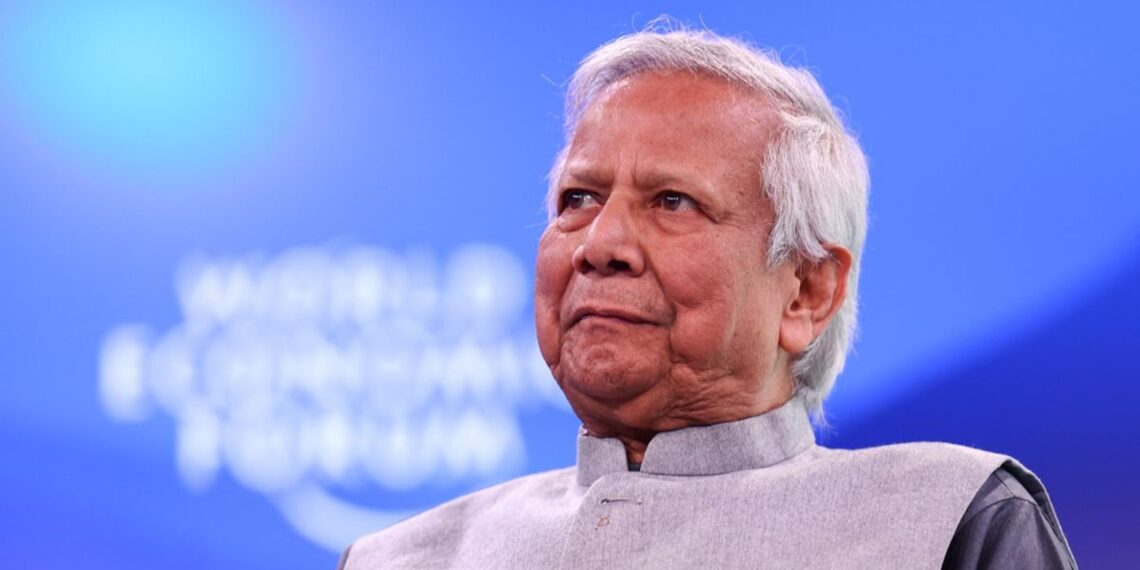An alleged graft case lodged by Bangladesh’s Anti-Corruption Commission (ACC) against a former Begum Rokeya University, Rangpur (BRUR) vice-chancellor and a popular talk show guest and a few others has once again brought to the fore the Mohammad Yunus-led interim regime’s continuing move to muzzle free speech across the country.
Former BRUR Vice-Chancellor Nazmul Ahsan Kalimullah was slapped with cases related to alleged embezzlement and advance payment of bills to contractors. Similar cases were lodged against another vice-chancellor of the same university, Professor AKM Nur un Nabi, ex-Executive Engineer Jahangir Alam and contractors A Salam Bachchu and MM Habibur Rahman.
An eminent educationist, Kalimullah has been speaking up against the reported missteps of the Yunus-led interim government, largely aimed at the well-documented instances of malgovernance, corruption, nepotism and political chicanery allegedly indulged in by key functionaries of the current regime.
The four-year-old ACC case against him, which was contested by the then BRUR vice-chancellor on the ground that it was malafide, appears to be part of a wider move that has already hit independent journalism hard since the Awami League regime led by Shekh Hasina fell in August 2024.
Kalimullah was equally vocal against the erstwhile Awami League government, speaking in the strongest of terms against its many cases of human rights abuses, corruption, extra-judicial methods and destruction of state and democratic institutions.
When the Yunus-led interim authority took charge in August last year, many in Bangladesh thought that it would usher in a new phase in Bangladesh’s politics.
It gave rise to new hopes and aspirations insofar as restoring Bangladesh’s state and democratic institutions and reestablishing the rule of law.
However, it took little time for the Yunus-led regime to emulate the Awami League.
Since August 5, 2024, over a thousand journalists were dismissed from their jobs, private TV news channels were forcibly taken over and renowned scribes were fired overnight.
In at least 327 instances, baseless murder charges were lodged against several of these journalists. In several cases, the bank accounts of journalists have been frozen.
This intimidation and heavy-handed approach was extended to 168 journalists whose press accreditation was summarily cancelled.
As many as 92 journalists were either expelled from or their membership to the national and district level press clubs was suspended.
Yunus, of course, remained completely silent as the state’s agencies moved to first muzzle and then shackle the press.
The interim regime filled the void with its own men and women.
So, there are now as many as six or seven journalists – ideologically opposed to the Awami League – who form part of Yunus’ media team, all of whom have been given government positions.
His chief media adviser is former journalist Shafiqul Alam who is known less for any remarkable journalism than for being less than economical with the truth.
His lies have been nailed too often to even find mention here, but his singular achievement has been to lay bare his own artifices.
Yunus, however, continues to repose faith in this fibster, unmindful or uncaring of the damage Alam has done to his rag-tag regime in general and himself in particular.
Last month, the International Federation of Journalists launched the South Asia Press Freedom Report 2024-25.
The report delved into the complexities and challenges faced by an industry that is endeavouring to find level footing and steady ground in Bangladesh’s fast-shrinking democratic spaces riven by political rivalry and violence and massive economic and civil disruption.
Alongside muzzling the press, the Yunus-led regime has quite successfully been able to project itself as reformist. But this too is skin deep.
The Media Reform Commission, led by a veteran London-based journalist, submitted a set of 20 key recommendations to the interim regime.
While the recommendations were mostly regulatory in nature, there was little that the commission said on the violence perpetrated on journalists or restoration of their rights.
ALSO READ: Assam Royal Global University launches scholarships for CRPF families
The thrust was mostly on regulating corporate control and on “blacklisting” media organisations who will be found to pursue “unethical” practices.
Bangladesh’s mediascape is as much divided and fragmented on political lines as its political terrain. Each time a new political dispensation wrests control in Dhaka, there is widespread retribution across all fields, including the media.
The Yunus-led interim regime has been able to practically sweep clean the Awami League’s Augean stable, but it must be mindful of what might happen to its media acolytes when another political switchover happens.















